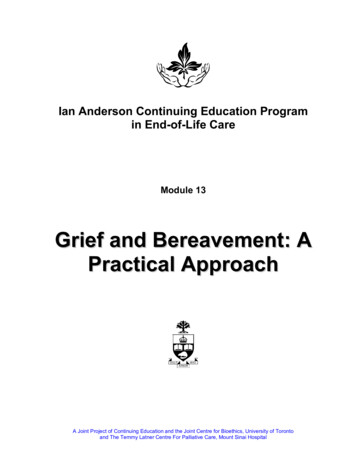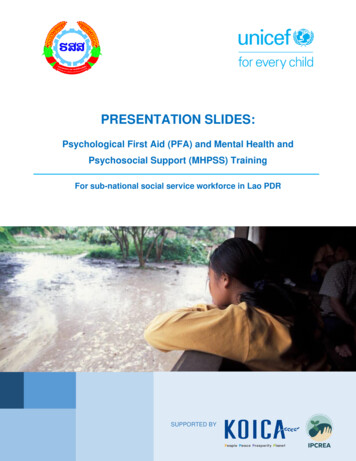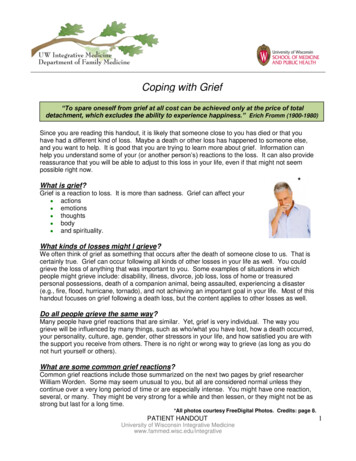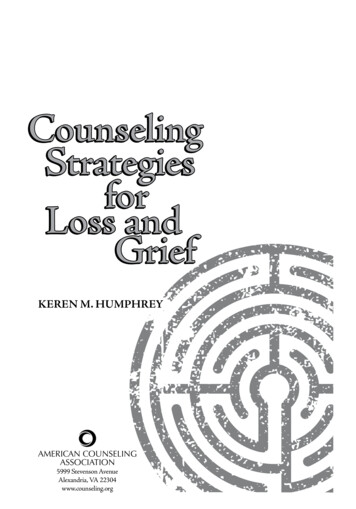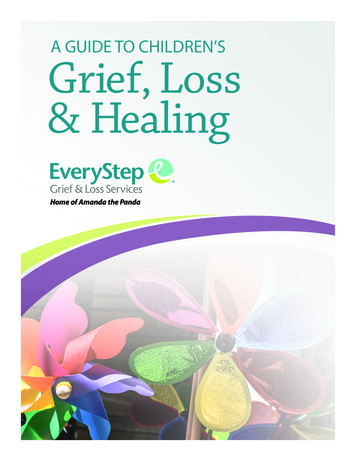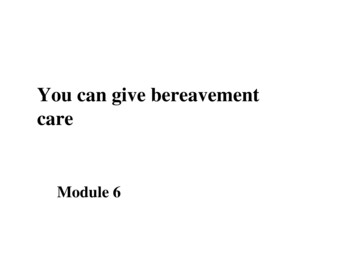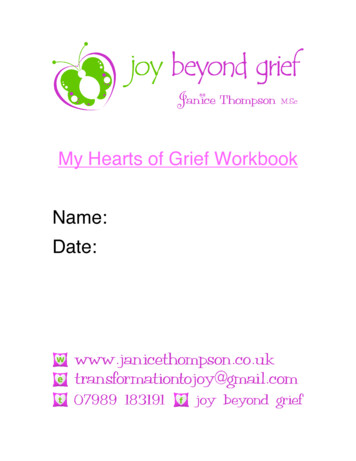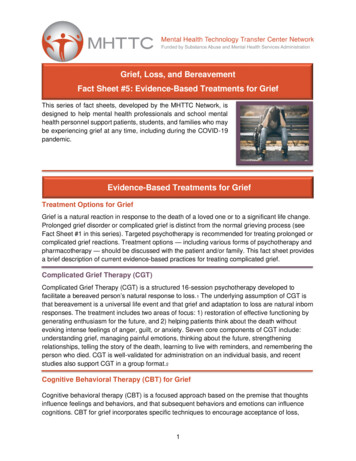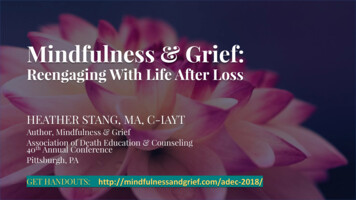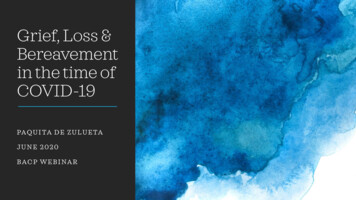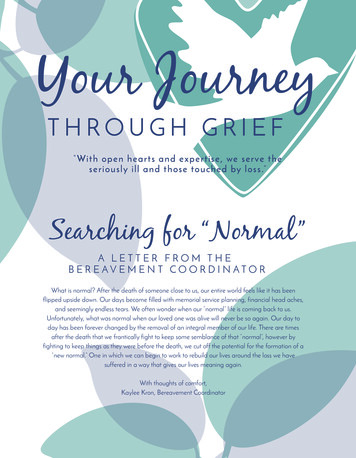
Transcription
Your JourneyTHROUGH GRIEF“Wi th op e n h e a r t s a n d e x p e r t i s e , we s e r ve t h es e r i ous l y i l l a n d t h o s e to u c h e d by l o s s .”Searching for “Normal”A LETTER FROM THEB E R E AV E M E N T CO O R D I N ATO RWhat is normal? After the death of someone close to us, our entire world feels like it has beenflipped upside down. Our days become filled with memorial service planning, financial head aches,and seemingly endless tears. We often wonder when our “normal” life is coming back to us.Unfortunately, what was normal when our loved one was alive will never be so again. Our day today has been forever changed by the removal of an integral member of our life. There are timesafter the death that we frantically fight to keep some semblance of that “normal”, however byfighting to keep things as they were before the death, we cut off the potential for the formation of a“new normal.” One in which we can begin to work to rebuild our lives around the loss we havesuffered in a way that gives our lives meaning again.With thoughts of comfort,Kaylee Kron, Bereavement Coordinator
Just for YouE S TA B L I S H I N G A N E W “ N O R M A L”BY K AY L E E K R O NWhen we look back on the lives we shared withthe person who has died, we often reflect on theaspects we really enjoyed; coming home to abig hug, calling them for advice or to tell them astory that only they would understand, seeing amovie with them, and so much more. Aftersomeone close to us dies, we are left with a verybig hole in our lives. Their death is only just thebeginning of the losses we experience. Our dailyliving has been impacted in a very significantway and we continue to realize those losses astime goes by. Perhaps one of the biggest lossesthat occurs within a death is the loss of ouridentity within the boundaries of the relationshipwe had with our loved one.In the weeks or months or years following thedeath, we begin to wonder who we are now, ifnot a wife, a husband, a child, a caregiver, or afriend to that very special person. This questioning of identity is an indication that we are at avery special stage in the grief process; thedevelopment of a new self-identity, and as aresult of that, establishing a new “normal.” Thisstage comes once we have reached an acceptance of the death. This is not to say that we areokay with our loved one dieing. Acceptancesimply means that we recognize that this loss isreal, it is painful, and life must continue to moveforward.Moving forward in life is essential to developinga new normal. Just as grief is unique to eachindividual, establishing a new normal is aprocess that varies from person to person. Onecommonality though, is that during this process,we are often given the choice to either moveforward, or stay where we are. These choicesoften look like a new opportunity that presentsitself.It can be difficult to figure out if this new opportunity is something to pursue or not. We getcaught up in a flurry of self-questioning; “Whatwould others think if I chose to do this?”, “Wouldmy loved one approve?”, “Is it too soon after thedeath to do this?” Questioning ourselves often
leads to erring on the side of caution, likelymeaning that we do not move forward. Sometimes staying put is a good thing, however, if weare never choosing to move forward, we maystart to feel stuck as though life doesn’t havemuch meaning without our loved one.A useful tool that can be used to cut throughself-questioning and self-doubt is the GriefCompass. The Grief Compass is simple to useand will get us to a place where moving forwardbecomes more possible. To use it, simply ask; “Isthis something that feels good to me or does thethought of doing this feel wrong, or hurt me insome way?” Cutting through all the unnecessaryself-doubting questions to the core of healingwill serve to make your decision much simpler.If we continually choose to move toward thechoices that feel good to us, then we often endup in a place of healing. It establishes a newnormal that will work best for us. So as we worktoward moving forward remember that it willnever mean that we do not yearn for those welove who have died, or that we prefer a lifewithout them. Moving forward simply meansthat since we didn’t have a choice in the matter,we are making a conscious effort to go on livinga life of fulfillment. And when it really comesdown to it, by moving forward, we are trulyliving the life that our loved one wants us to.“Don’t forget you’re human. It’s okay to have a meltdown.Just don’t unpack and live there. Cry it out and thenrefocus on where you are headed.” Author Unknown
RECOMMENDED READINGAUTHOR BRENE BROWN, PHD. LMSWBren Brown, PhD. and Licensed Master SocialWorker provides a wonderfully written “how to”book about what to do after we fall down, whenlife hands us something we didn’t want and donot know how to handle. Rising Strong discussesthe power of rising after falling down.Brown calls out to all those who are looking tomove forward by challenging them to “daregreatly,” even when that almost certainly meansfailing from time to time.Using personal accounts and endless research,Brene Brown encourages all readers to step intothe arena and transform the way we live.Although this is not a book about grief, it doesgive those of us who are working through griefsomewhat of a road map to moving forwardfollowing a great loss.“Grief changes us. The pain sculpts us into someone who understands more deeply, hurts more often, appreciates more quickly,cries more easily, hopes more desperately, and loves more openly.” Author Unknown
Spiritual CareTHE NEW NORMALBY REV JENNIFER HACKENBRUCHS P I R I T U A L C A R E CO O R D I N ATO RWhat is normal? It is probably a question youhave asked yourself more than once throughout your life. Your normal is different than yourneighbor’s normal and their neighbor’s normal.And now, after the loss of your loved one, yournormal is no longer the same. After your loss,there is a process of finding your new normal.The truth is, life will never be normal, like it wasbefore the loss of your loved one. Take abreath with this: life will never be normal, like itwas before the loss of your loved one. This isokay.What is the new normal? Your new normal willbe different. You will remember what normalwas before your loss, and one day will have anew normal. The two will not be the same.Allow yourself time to not be normal. Let go oftrying to make normal look like it did before.When will be new normal come to be? Onlytime will answer that question for you. It is okayto not be the old normal for as long as it takes.Given time, you will settle into a new normal. Inthe meantime, let go of judgment of what youor others think “normal” should look like.Breathe with this: it is okay to not be normal,until a new normal settles in.Take a breath, all the way into your body.Breathing in through your nose, and breathingout through your nose. Settle into this moment.There is nothing else for you to do in thismoment, except breathe.As I breathe inI let go of what normal wasAs I breathe outI accept not being normal, until it is.Give yourself time, as much time as it takes, tosettle into your new normal. You will find yournew normal, in time.“You're going to be okay. Just breathe and think to yourself of all thetimes in the past that you've felt this much pain. Remind yourself howeach time, you made it through. Breathe and trust that as long as youdon't give up, you will make it." Daniell Koepke
Kids In GriefM A I N TA I N I N G R O U T I N E SWhen there is a death in the family, children areundoubtedly affected. With death come manychanges. Perhaps this change is in where thechild lives, who picks them up from school, orwho they spend a holiday with. Even the smallest amount of change that occurs is felt greatlyby a child in the family. As kids are learning anddeveloping, they become reliant on their dailylives being predictable and reliable. When adeath occurs, this becomes much more difficultfor parents and caregivers to maintain.Regardless of this significant life change,children continue to be in need of some normalcy, even through the early days of grief. Attimes, parents and guardians may feel asthough a child needs less rules and moreallowance to do what a child feels they need todo. What results is a child who is not onlygrieving, but who is also unsure about almosteverything. As a parent or guardian, it is essential to maintain some semblance of routinesand rules in order for a child to feel like theirwhole world has not been turned upside down.Here are a few tips on maintaining structure inthe home while a family is experiencing grief.1.School:a.Because children do best when theyknow what to expect from their day, it is important that they continue to go to school followingthe death of someone close. The structure of aschool environment can help them regulatetheir strong emotions by providing an 8 hourdistraction from their loss.b.That being said, it is also important toinform teachers and counselors at the school sothat when a child needs additional support,there are understanding adults to talk tothroughout the day. Make sure the child knowsthat they are safe to ask to take a break or gotalk to a counselor.(Continued on the next page)Hospice of North Idaho complies with applicable federal civil rights laws and does not discriminate on the basis of race, color, national origin,age, disability, sex or spiritual and religious belief. ATTENTION: If you speak Spanish, Chinese, Russian, Vietnamese, Tagalog - Filipino,Arabic, Ukrainian, Cambodian, Japanese, French, Romanian, German, Portuguese, Korean, or Nepali language assistance services, free ofcharge, are available to you. 1-800-368-1019, (TTY: 7-1-1). ATENCIÓN: si habla español, tiene a su disposición servicios gratuitos deasistencia lingüística. Llame al 1-800-368-1019, (TTY: 7-1-1). 1019, (TTY: 7-1-1).
2.Home:a.When a family is grieving and dealingwith the aftermath of a death, including funeralarrangements, family in town, and managing theestate, the idea of keeping a normal daily routineis simply not doable. A way to help childrenthrough the loss of normal routines is to bringthem into the conversation about what their dayis going to look like. Children will typically be ableto follow a parent’s lead as long as they are inthe loop. They might even surprise a parent andbecome a great helper!b.Parents and guardians often want to beextra gentle with children after someone in thefamily has died. This includes becoming veryrelaxed on routines, rules, and expectations.However, the reality is that this can cause newproblems aside from grief. Maintaining rules andexpectations for children will never hurt, however,sometimes maintaining rules and other times notmaintaining rules will only serve to confuse achild when they really need things to be straightforward.When navigating through a death with a child,remember that each child’s grief is unique tothem. As their parent or guardian, you knowthem best. Using these basic guidelines, with yourknowledge and love as a parent and caregiver,will no doubt assist your child in finding their waythrough grief.“All kids need is alittle help, a littlehope, andsomebody whobelieves in them.” Magic Johnson
H O S P I C E O F N O RT H I DA H O2 2 9 0 We s t Pr a i r i e Av e n u eCo e u r d ’A l e n e I D 8 3 8 1 5Upcoming EventsHOSPICE OF NORTH IDAHO IS HERE FOR YOUONGOINGSUPPORTRegister for counseling, groups, and kids camp withK a y l e e K r o n L M S W, B e r e a v e m e n t C o o r d i n a t o r b y c a l l i n g(208)772-7994.TEENS IN GRIEFFind a community of peers ages 13-17 and know that you arenot alone in grief. Meet up on Mondays after school for6-weeks at the new Hospice Campus.PARENT LOSSThis new support group for parents begins March 1st, 2018 at5:30 PM at the new Hospice Campus. No matter our age,losing a parent or parental figure is never easy.MOVING IN MARCHOur new campus includes a community building where manygrief programs will take place. Next to the SchneidmillerH o u s e a t 2 2 9 0 We s t P r a i r i e A v e n u e , C o e u r d ’A l e n e .Share this newsletter and find additional support at www.hospiceofnorthidaho.org
Brene Brown encourages all readers to step into the arena and transform the way we live. Although this is not a book about grief, it does give those of us who are working through grief somewhat of a road map to moving forward following a great loss. RECOMMENDED READING AUTHOR BRENE BROWN, PHD. LMSW "Grief changes us.
